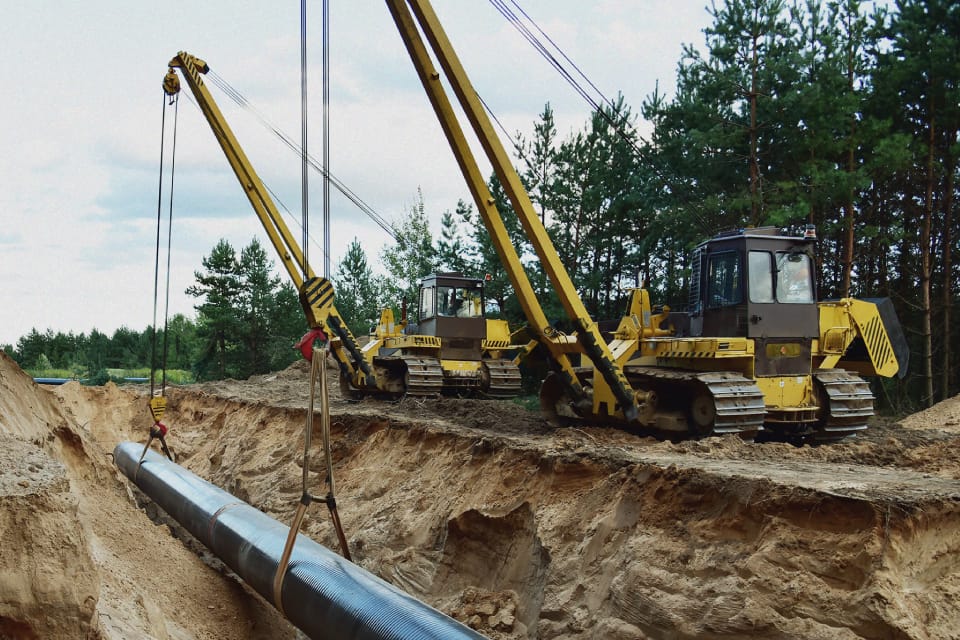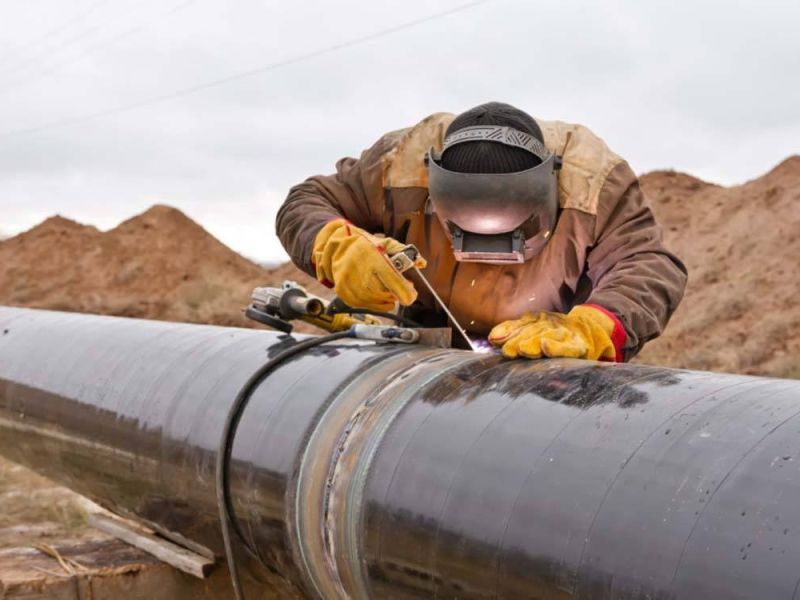How Creek Pipe Texas Is Reshaping the Pipeline Industry in West Texas
Wiki Article
A Comprehensive Overview to Understanding Pipelines and Their Function in Construction
Pipelines are important parts in building and construction, offering crucial features in waste, gas, and water administration. Their selection and application can greatly influence a structure's efficiency and safety and security. Different materials, such as PVC, copper, and PEX, provide distinctive advantages fit to details requirements (Creek Pipe Company LLC). Understanding these aspects is key for any construction job. As one checks out the intricacies of pipes, the ramifications for conformity and public wellness ended up being increasingly noticeableThe Relevance of Pipes in Building
Pipelines work as vital conduits in construction, promoting the activity of water, gas, and waste throughout structures and framework. Their role extends past plain transportation; they are vital for guaranteeing the performance and safety and security of domestic and industrial atmospheres. Effectively mounted pipelines add to the reliable distribution of sources, enabling daily tasks such as bathing, heating, and food preparation. Pipelines play an essential role in waste administration, making sure that sewer and wastewater are efficiently eliminated from living spaces.The significance of pipes is likewise mirrored in their influence on public health and wellness. Malfunctioning or insufficient piping systems can result in contamination and unsafe problems, making quality products and installment methods vital. In addition, pipes must follow different building regulations and guidelines, which are made to safeguard both occupants and the setting. Consequently, the relevance of pipes in building and construction encompasses both sensible functionality and essential health factors to consider.Types of Piping Made Use Of in Building Jobs
Numerous sorts of pipes play a considerable duty in structure jobs, each designed to satisfy particular demands and applications. Among one of the most frequently utilized pipe kinds are PVC, which is resistant and lightweight to deterioration, making it perfect for drain and air vent systems. CPVC pipelines, similar to PVC, can withstand higher temperatures, usually used in warm water systems. Copper pipelines are understood for their toughness and reliability, regularly employed in pipes and heating applications. Galvanized steel pipelines, while much less typical today, were as soon as a criterion for supply of water lines because of their stamina. Furthermore, PEX (cross-linked polyethylene) pipelines are acquiring appeal for household pipes as a result of their adaptability and resistance to scaling and chlorine. Cast iron pipelines are favored for their sound-dampening residential or commercial properties, typically made use of in waste and dirt systems. Each pipe kind serves unique functions, guaranteeing efficient procedure in construction jobs.Usual Products for Pipes and Their Properties
In construction, the selection of pipe materials is crucial for ensuring sturdiness and capability. Metal pipes offer toughness and resistance to high pressures, while plastic pipelines supply lightweight and corrosion-resistant choices. Compound pipelines incorporate the benefits of both materials, making them flexible alternatives for various applications.Metal Pipe Options
Steel pipes are indispensable parts in building, offering a range of options that cater to various applications and environmental conditions. One of the most common products consist of steel, copper, and cast iron. Steel pipes are known for their toughness and toughness, making them ideal for high-pressure applications. Copper pipelines are favored for their deterioration resistance and antimicrobial buildings, typically made use of in pipes systems. Cast iron pipelines offer superb audio insulation and are optimal for waste and water drainage systems. Each metal type has unique benefits; as an example, galvanized steel can stand up to corrosion, while stainless steel supplies superior rust resistance. Selecting the proper steel pipeline relies on factors such as cost, ecological exposure, and the particular requirements of the building and construction job.
Plastic Pipeline Advantages
Plastic pipelines have gained appeal in building due to their lightweight nature and flexibility. These pipelines, made from products such as PVC, CPVC, and PE, deal excellent resistance to rust and chemical damages, making them appropriate for different applications. Their simplicity of installment additional boosts their charm, as they can be reduced and signed up with without special devices. In addition, plastic pipelines are normally more affordable compared to steel alternatives, adding to reduced total job costs. Their smooth interior surfaces lower rubbing and improve flow rates, while insulation properties assist maintain temperature control in pipes systems - Creek Pipe Pipeline Construction. With a vast array of sizes and setups offered, plastic pipelines properly satisfy the diverse demands of contemporary building tasksCompound Pipe Characteristics
Composite pipelines integrate various products to take advantage of their specific staminas, leading to enhanced performance and sturdiness. Generally, these pipes consist of layers that may include ceramics, plastics, and steels, each contributing one-of-a-kind residential or commercial properties. The inner layer may be made of a corrosion-resistant product, while the outer layer offers toughness and impact resistance. This combination permits composite pipelines to hold up against extreme temperatures and stress, making them ideal for a large range of applications, consisting of supply of water and commercial processes. Additionally, composite pipes are often lighter than conventional products, promoting much easier handling and setup. Their convenience and flexibility to various atmospheres make them a favored option in modern-day construction tasks, ensuring durability and efficiency in fluid transport systems.Applications of Pipeline in Plumbing Solutions

Electric Conduits: The Function of Pipes in Circuitry
In contemporary construction, electric avenues play an important role in ensuring the reliable and safe transmitting of electrical wiring throughout buildings. These pipelines give a safety pathway for electrical cords, securing them from physical damage and environmental factors. Numerous products, such as PVC, metal, and flexible conduits, are made use of depending on the specific demands of the installation.Furthermore, conduits help in arranging circuitry systems, lowering the danger of electric threats like short circuits or fires. They likewise assist in much easier upkeep and upgrades, as cables can be accessed and replaced without considerable interruption to the structure.Proper installment of electrical avenues is important for conformity with building regulations and security regulations. This organized technique not only boosts the longevity of the electric system yet likewise adds to the overall safety and performance of the building, making electrical avenues indispensable in contemporary construction methods.Picking the Right Pipe for Your Job
How can one assure the right pipe choice for a construction task? The selection process starts with comprehending the certain needs of the project, consisting of the sort of liquids being transferred, pressure scores, and ecological conditions. Product choices, such as Steel, pvc, and copper, need to be assessed based on durability, deterioration resistance, and thermal properties.Next, one need to think about the pipe's diameter and flow capability to determine efficient operation. Regulative criteria and codes should likewise be stuck to, as they dictate the acceptable materials and practices for particular applications. Consulting with specialists and making use of considerable sources can better help in making educated decisions.Finally, evaluating the cost-effectiveness of various options is vital, stabilizing first expenses with long-term upkeep and substitute prices - Creek Pipe Midland. By thoroughly evaluating these aspects, one can with confidence select one of the most suitable pipeline for their building and construction task, ensuring both performance and compliance
Maintenance and Assessment of Piping in Construction
Proper option of pipelines sets the foundation for their long-lasting efficiency, making upkeep and examination critical parts in construction. Normal upkeep assurances that any kind of possible issues, such as leaks, corrosion, or clogs, are identified and resolved without delay, minimizing costly repairs and task hold-ups. Set up examinations, consisting of aesthetic evaluations and stress tests, play a crucial role in reviewing the integrity of pipe systems.Additionally, checking ecological aspects, such as temperature level fluctuations and soil problems, can aid prepare for damage. Using innovative modern technologies, such as CCTV for interior assessments, can improve the efficiency of maintenance initiatives. It is important to record evaluation searchings for and upkeep activities to establish a comprehensive history of the pipeline systems. By focusing on upkeep and evaluation, building professionals can expand the life-span of their piping systems, guaranteeing they operate efficiently and dependably throughout the task's period.Frequently Asked Concerns
Exactly How Do Pipes Influence Energy Efficiency in Buildings?
Pipelines considerably influence energy efficiency in buildings by managing heating and cooling down systems. Correct insulation and products lower energy loss, while effective plumbing designs reduce water usage, eventually bring about reduced energy usage and functional prices.What Rules Govern Pipeline Installation in Building?
Regulations regulating pipeline setup in building and construction commonly consist of nationwide and neighborhood building codes, pipes codes, and safety and security requirements. These guarantee compliance with architectural honesty, product specifications, and health and wellness demands, promoting security and performance in construction techniques.Can Water Lines Be Recycled After Use?
The concern of pipe recyclability is significant. Many materials, such as metal and specific plastics, can be reused effectively. The condition and kind of pipe impact reusing feasibility, requiring proper assessment prior to disposal.
Just How Do Weather Impact Pipe Efficiency?
Weather considerably influence pipe efficiency. Extreme temperature levels can create growth or tightening, while wetness may bring about rust. Additionally, heavy rainfall can raise soil pressure, impacting stability and general performance of the piping system.What Are the Indicators of Pipeline Failure to Look For?
Indications of pipe failure include leaks, unusual sounds, discoloration of water, decreased water stress, and visible rust. Normal evaluations can assist spot these issues early, stopping expensive repairs and making sure system functionality in the long-term. Pipes play a critical function in waste management, making sure that sewer and wastewater are efficiently gotten rid of from living spaces.The significance of pipes is additionally reflected in their effect on public wellness. In construction, the option of pipeline products is essential for guaranteeing sturdiness and functionality. Metal pipes use strength and resistance to high pressures, while plastic pipes provide corrosion-resistant and light-weight choices. In addition, pipes are utilized to get rid of wastewater, connecting bathrooms, sinks, and drains pipes to community sewage systems or septic tanks.Different types of pipes, such as PVC, copper, and PEX, are picked based on elements like longevity, cost, and particular application demands. Exactly how can one assure the best pipeline choice for a construction project?Report this wiki page